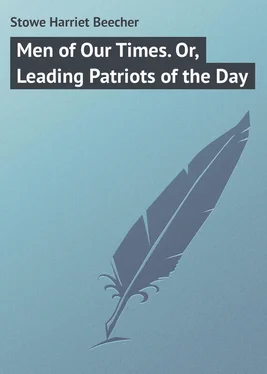Harriet Stowe - Men of Our Times. Or, Leading Patriots of the Day
Здесь есть возможность читать онлайн «Harriet Stowe - Men of Our Times. Or, Leading Patriots of the Day» — ознакомительный отрывок электронной книги совершенно бесплатно, а после прочтения отрывка купить полную версию. В некоторых случаях можно слушать аудио, скачать через торрент в формате fb2 и присутствует краткое содержание. ISBN: , Жанр: foreign_language, foreign_prose, на английском языке. Описание произведения, (предисловие) а так же отзывы посетителей доступны на портале библиотеки ЛибКат.
- Название:Men of Our Times. Or, Leading Patriots of the Day
- Автор:
- Жанр:
- Год:неизвестен
- ISBN:http://www.gutenberg.org/ebooks/46347
- Рейтинг книги:5 / 5. Голосов: 1
-
Избранное:Добавить в избранное
- Отзывы:
-
Ваша оценка:
- 100
- 1
- 2
- 3
- 4
- 5
Men of Our Times. Or, Leading Patriots of the Day: краткое содержание, описание и аннотация
Предлагаем к чтению аннотацию, описание, краткое содержание или предисловие (зависит от того, что написал сам автор книги «Men of Our Times. Or, Leading Patriots of the Day»). Если вы не нашли необходимую информацию о книге — напишите в комментариях, мы постараемся отыскать её.
Men of Our Times. Or, Leading Patriots of the Day — читать онлайн ознакомительный отрывок
Ниже представлен текст книги, разбитый по страницам. Система сохранения места последней прочитанной страницы, позволяет с удобством читать онлайн бесплатно книгу «Men of Our Times. Or, Leading Patriots of the Day», без необходимости каждый раз заново искать на чём Вы остановились. Поставьте закладку, и сможете в любой момент перейти на страницу, на которой закончили чтение.
Интервал:
Закладка:
The progress of our arms, upon which all else chiefly depends is as well known to the public as to myself, and it is, I trust, reasonably satisfactory and encouraging to all. With high hope for the future, no prediction in regard to it is ventured.
On the occasion corresponding to this four years ago, all thoughts were anxiously directed to an impending civil war. All dreaded it; all sought to avoid it. While the inaugural address was being delivered from this place, devoted altogether to saving the Union without war, insurgent agents were in the city seeking to destroy it without war – seeking to dissolve the Union and divide the effects by negotiation. Both parties deprecated war, but one of them would make war rather than let the nation survive, and the other would accept war rather than let it perish, and the war came.
One-eighth of the whole population were colored slaves, not distributed generally over the Union, but localized in the Southern part of it. These slaves constituted a peculiar and powerful interest. All knew that this interest was somehow the cause of the war. To strengthen, perpetuate and extend this interest, was the object for which the insurgents would rend the Union even by war, while the Government claimed no right to do more than to restrict the territorial enlargement of it.
Neither party expected for the war the magnitude or the duration which it has already attained. Neither anticipated that the cause of the conflict might cease with, or even before the conflict itself should cease. Each looked for an easier triumph, and a result less fundamental and astounding.
Both read the same Bible and prayed to the same God, and each invoke his aid against the other. It may seem strange that any men should dare to ask a just God's assistance in wringing their bread from the sweat of other men's faces, but let us judge not, that we be not judged. The prayers of both could not be answered. That of neither has been answered fully. The Almighty has his own purposes. 'Woe unto the world because of offences, for it must needs be that offences come: but woe to that man by whom the offence cometh.' If we shall suppose that American slavery is one of these offences, which in the providence of God must needs come, but which having continued through his appointed time, He now wills to remove, and that he gives to both North and South this terrible war as the woe due to those by whom the offence came, shall we discern therein any departure from those divine attributes which the believers in a living God always ascribe to Him? Fondly do we hope, fervently do we pray, that this mighty scourge of war may soon pass away. Yet, if God wills that it continue until all the wealth piled by the bondman's two hundred and fifty years of unrequited toil shall be sunk, and until every drop of blood drawn with the lash shall be paid with another drawn with the sword, as was said three thousand years ago; so, still it must be said, 'The judgments of the Lord are true and righteous altogether.'
With malice toward none, with charity for all, with firmness in the right, as God gives us to see the right, let us strive on to finish the work we are in, to bind up the nation's wounds, to care for him who shall have borne the battle and for his widow and orphans, to do all which may achieve and cherish a just and a lasting peace among ourselves and with all nations."
The words of Lincoln seemed to grow more clear and more remarkable as they approached the end. Perhaps in no language, ancient or modern, are any number of words found more touching and eloquent than his speech of November 19, 1863, at the Gettysburg celebration. He wrote it in a few moments, while on the way to the celebration, on being told that he would be expected to make some remarks, and after Mr. Everett's oration he rose and read it. It was as follows:
"Fourscore and seven years ago, our fathers brought forth on this continent a new nation, conceived in liberty, and dedicated to the proposition that all men are created equal. Now, we are engaged in a great civil war, testing whether that nation, or any nation, so conceived and dedicated, can long endure. We are met on a great battle-field of that war. We have come to dedicate a portion of that field as a final resting-place for those who here gave their lives that the nation might live. It is altogether fitting and proper that we should do this.
But in a larger sense, we cannot dedicate, we cannot consecrate, we cannot hallow, this ground. The brave men, living and dead, who struggled here, have consecrated it far above our poor power to add or detract. The world will little note, nor long remember what we say here, but it can never forget what they did here. It is for us, the living, rather to be dedicated here to the unfinished work which they who fought here have thus far so nobly advanced. It is rather for us to be here dedicated to the great task remaining before us, that from these honored dead, we take increased devotion to that cause for which they gave the last full measure of devotion; that we here highly resolve that these dead shall not have died in vain; that this nation, under God, shall have a new birth of freedom; and that government of the people, by the people, and for the people, shall not perish from the earth."
The audience had admired Mr. Everett's long address. At Mr. Lincoln's few words, they cheered and sobbed and wept. When Mr. Lincoln had ended, he turned and congratulated Mr. Everett on having succeeded so well. Mr. Everett replied, with a truthful and real compliment, "Ah, Mr. Lincoln, how gladly I would exchange all my hundred pages, to have been the author of your twenty lines!"
Probably no ruler ever made a more profoundly and peculiarly Christian impression on the mind of the world than Lincoln. In his religious faith two leading ideas were prominent from first to last – man's helplessness, both as to strength and wisdom, and God's helpfulness in both. When he left Springfield to assume the Presidency, he said to his townsmen:
"A duty devolves on me which is perhaps greater than that which has devolved on any other man since the days of Washington. He never would have succeeded but for the aid of divine Providence, on which he at all times relied, and I feel that I cannot succeed without the same Divine aid which sustained him. On the same Almighty Being I place my reliance for support, and I hope that you, my friends, will pray that I may receive that Divine assistance, without which I cannot succeed, but with which success is certain."
Abraham Lincoln's whole course showed that he possessed that faith without which, St. Paul says, it is impossible to please God, for "he that cometh to God must believe that He IS, and that He is a rewarder of those who diligently seek him ."
And now our Christian pilgrim having passed through the valley of the shadow of death, and slain and vanquished giants and dragons, at last had a little taste, a few days sojourn, in the land of Beulah.
Cheer after cheer rose up and shook the land as by one great stroke after another the awful convulsions of the conflict terminated in full, perfect, final victory.
Never did mortal man on this earth have a triumph more dramatic and astounding than Lincoln's victorious entry into Richmond. Years before, when a humble lawyer in Illinois, a man without prestige of person or manners or education, he had espoused what the world called the losing side, and been content to take the up-hill, laborious road. He had seen his rival, adorned with every external advantage of person, manners, eloquence and oratory, sweeping all prizes away from him, and far distancing him in the race of political ambition.
In those days, while confessing that he had felt the promptings of ambition, and the disappointment of ill success, there was one manly and noble sentiment that ought to be printed in letters of gold, as the motto of every rising young man. Speaking of the distinction at which Douglas was aiming, he said:
Читать дальшеИнтервал:
Закладка:
Похожие книги на «Men of Our Times. Or, Leading Patriots of the Day»
Представляем Вашему вниманию похожие книги на «Men of Our Times. Or, Leading Patriots of the Day» списком для выбора. Мы отобрали схожую по названию и смыслу литературу в надежде предоставить читателям больше вариантов отыскать новые, интересные, ещё непрочитанные произведения.
Обсуждение, отзывы о книге «Men of Our Times. Or, Leading Patriots of the Day» и просто собственные мнения читателей. Оставьте ваши комментарии, напишите, что Вы думаете о произведении, его смысле или главных героях. Укажите что конкретно понравилось, а что нет, и почему Вы так считаете.












